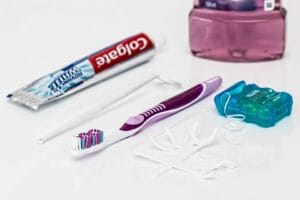During a comprehensive dental examination, our team will look for signs of oral cancer. Early detection is key with oral cancer. If caught early, most forms of oral cancer are treatable. Our dental team is trained and educated to identify oral cancer.

Everyone is susceptible to the disease, but some groups of people are at a higher risk level than others. Here are the top seven risk factors for oral cancer.
Age
Are you in your mid 40s? Your risk of developing oral cancer increases with age. A noticeable increase is evident in people in their 40s and older. According to the Cancer Treatment Centers of America, the majority of diagnosed cases occur around the age of 62, but the average age is declining. The recent increase in Human Papillomavirus (HPV) related cases is causing more people to be diagnosed for oral cancers between the ages of 52 and 56. As the average age for oral cancer cases decreases, it is vital that you receive regular oral cancer screenings at any age.
Gender
Men are twice as likely to develop oral cancer compared to women. Part of this difference may be related to regular intake of alcohol and tobacco. According to the American Cancer Society, the gender difference is decreasing since more women are drinking and using tobacco today than in previous generations. There has also been a trend in recent years of younger men being diagnosed with HPV-related oral cancer. Both men and women should schedule regular oral health examinations to detect oral cancer early.
Tobacco
Smoking or chewing tobacco can greatly increase your risk of developing oral cancer. Tobacco can lead to cancer of the mouth or throat. Additionally, oral tobacco products cause cancers associated with the cheeks, gums, and inner surface of the lips. Development of these cancers depend on the duration and frequency of tobacco use. Non-smokers are not immune to oral cancer, so be sure to schedule an appointment with our team for an examination.
Alcohol
Among those that are diagnosed with oral cancer, about 70% of people are characterized as heavy drinkers. According to the Centers for Disease Control and Prevention (CDC), heavy drinking is defined as having an average of two or more drinks per day for men, and one or more drinks per day for women. People who drink heavily can be more than twice as likely to develop oral cancers than people who do not drink. Oral cancer can still occur in people who have never had an alcoholic drink. Contact our team to schedule an examination.
Human Papillomavirus (HPV)
This sexually transmitted disease is associated with at least 10,000 cases of oral cancer diagnosed each year in the United States. People who have HPV-related oral cancers tend to be younger and are unlikely to smoke or drink. Typically, those diagnosed with HPV-related oral cancers are at a much lower risk of death or reoccurrence. We suggest a proactive approach by maintaining regular visits to our dental office.
Sunlight
People who work outside or with prolonged exposure to sunlight have a higher risk of developing lip cancer. It is vital to use UV protection when under the sun. Many lip balms offer UV protection. If you work outdoors frequently, schedule an additional examination with our team.
Diet
Poor nutrition can increase your risk for developing oral cancer. According to the American Dental Association, reports have shown that a link exists between diets low in fruits and vegetables and a higher risk for oral cancers. However, oral cancer can develop in healthy individuals. No matter your diet, schedule a visit with our
Frankfort family dentist for a comprehensive
oral examination.
Oral cancer does not discriminate. While these seven factors have been tied to an increased risk of oral cancer, that does not diminish the importance of regular oral examinations for everyone regardless of their age, gender, or other factors. Regular dental examinations make it possible for
our team to detect oral cancer early.
Contact Snow Family Dental to schedule a comprehensive oral examination.
 Everyone is susceptible to the disease, but some groups of people are at a higher risk level than others. Here are the top seven risk factors for oral cancer.
Age
Are you in your mid 40s? Your risk of developing oral cancer increases with age. A noticeable increase is evident in people in their 40s and older. According to the Cancer Treatment Centers of America, the majority of diagnosed cases occur around the age of 62, but the average age is declining. The recent increase in Human Papillomavirus (HPV) related cases is causing more people to be diagnosed for oral cancers between the ages of 52 and 56. As the average age for oral cancer cases decreases, it is vital that you receive regular oral cancer screenings at any age.
Gender
Men are twice as likely to develop oral cancer compared to women. Part of this difference may be related to regular intake of alcohol and tobacco. According to the American Cancer Society, the gender difference is decreasing since more women are drinking and using tobacco today than in previous generations. There has also been a trend in recent years of younger men being diagnosed with HPV-related oral cancer. Both men and women should schedule regular oral health examinations to detect oral cancer early.
Tobacco
Smoking or chewing tobacco can greatly increase your risk of developing oral cancer. Tobacco can lead to cancer of the mouth or throat. Additionally, oral tobacco products cause cancers associated with the cheeks, gums, and inner surface of the lips. Development of these cancers depend on the duration and frequency of tobacco use. Non-smokers are not immune to oral cancer, so be sure to schedule an appointment with our team for an examination.
Alcohol
Among those that are diagnosed with oral cancer, about 70% of people are characterized as heavy drinkers. According to the Centers for Disease Control and Prevention (CDC), heavy drinking is defined as having an average of two or more drinks per day for men, and one or more drinks per day for women. People who drink heavily can be more than twice as likely to develop oral cancers than people who do not drink. Oral cancer can still occur in people who have never had an alcoholic drink. Contact our team to schedule an examination.
Human Papillomavirus (HPV)
This sexually transmitted disease is associated with at least 10,000 cases of oral cancer diagnosed each year in the United States. People who have HPV-related oral cancers tend to be younger and are unlikely to smoke or drink. Typically, those diagnosed with HPV-related oral cancers are at a much lower risk of death or reoccurrence. We suggest a proactive approach by maintaining regular visits to our dental office.
Sunlight
People who work outside or with prolonged exposure to sunlight have a higher risk of developing lip cancer. It is vital to use UV protection when under the sun. Many lip balms offer UV protection. If you work outdoors frequently, schedule an additional examination with our team.
Diet
Poor nutrition can increase your risk for developing oral cancer. According to the American Dental Association, reports have shown that a link exists between diets low in fruits and vegetables and a higher risk for oral cancers. However, oral cancer can develop in healthy individuals. No matter your diet, schedule a visit with our Frankfort family dentist for a comprehensive oral examination.
Oral cancer does not discriminate. While these seven factors have been tied to an increased risk of oral cancer, that does not diminish the importance of regular oral examinations for everyone regardless of their age, gender, or other factors. Regular dental examinations make it possible for our team to detect oral cancer early. Contact Snow Family Dental to schedule a comprehensive oral examination.
Everyone is susceptible to the disease, but some groups of people are at a higher risk level than others. Here are the top seven risk factors for oral cancer.
Age
Are you in your mid 40s? Your risk of developing oral cancer increases with age. A noticeable increase is evident in people in their 40s and older. According to the Cancer Treatment Centers of America, the majority of diagnosed cases occur around the age of 62, but the average age is declining. The recent increase in Human Papillomavirus (HPV) related cases is causing more people to be diagnosed for oral cancers between the ages of 52 and 56. As the average age for oral cancer cases decreases, it is vital that you receive regular oral cancer screenings at any age.
Gender
Men are twice as likely to develop oral cancer compared to women. Part of this difference may be related to regular intake of alcohol and tobacco. According to the American Cancer Society, the gender difference is decreasing since more women are drinking and using tobacco today than in previous generations. There has also been a trend in recent years of younger men being diagnosed with HPV-related oral cancer. Both men and women should schedule regular oral health examinations to detect oral cancer early.
Tobacco
Smoking or chewing tobacco can greatly increase your risk of developing oral cancer. Tobacco can lead to cancer of the mouth or throat. Additionally, oral tobacco products cause cancers associated with the cheeks, gums, and inner surface of the lips. Development of these cancers depend on the duration and frequency of tobacco use. Non-smokers are not immune to oral cancer, so be sure to schedule an appointment with our team for an examination.
Alcohol
Among those that are diagnosed with oral cancer, about 70% of people are characterized as heavy drinkers. According to the Centers for Disease Control and Prevention (CDC), heavy drinking is defined as having an average of two or more drinks per day for men, and one or more drinks per day for women. People who drink heavily can be more than twice as likely to develop oral cancers than people who do not drink. Oral cancer can still occur in people who have never had an alcoholic drink. Contact our team to schedule an examination.
Human Papillomavirus (HPV)
This sexually transmitted disease is associated with at least 10,000 cases of oral cancer diagnosed each year in the United States. People who have HPV-related oral cancers tend to be younger and are unlikely to smoke or drink. Typically, those diagnosed with HPV-related oral cancers are at a much lower risk of death or reoccurrence. We suggest a proactive approach by maintaining regular visits to our dental office.
Sunlight
People who work outside or with prolonged exposure to sunlight have a higher risk of developing lip cancer. It is vital to use UV protection when under the sun. Many lip balms offer UV protection. If you work outdoors frequently, schedule an additional examination with our team.
Diet
Poor nutrition can increase your risk for developing oral cancer. According to the American Dental Association, reports have shown that a link exists between diets low in fruits and vegetables and a higher risk for oral cancers. However, oral cancer can develop in healthy individuals. No matter your diet, schedule a visit with our Frankfort family dentist for a comprehensive oral examination.
Oral cancer does not discriminate. While these seven factors have been tied to an increased risk of oral cancer, that does not diminish the importance of regular oral examinations for everyone regardless of their age, gender, or other factors. Regular dental examinations make it possible for our team to detect oral cancer early. Contact Snow Family Dental to schedule a comprehensive oral examination.
 Everyone is susceptible to the disease, but some groups of people are at a higher risk level than others. Here are the top seven risk factors for oral cancer.
Age
Are you in your mid 40s? Your risk of developing oral cancer increases with age. A noticeable increase is evident in people in their 40s and older. According to the Cancer Treatment Centers of America, the majority of diagnosed cases occur around the age of 62, but the average age is declining. The recent increase in Human Papillomavirus (HPV) related cases is causing more people to be diagnosed for oral cancers between the ages of 52 and 56. As the average age for oral cancer cases decreases, it is vital that you receive regular oral cancer screenings at any age.
Gender
Men are twice as likely to develop oral cancer compared to women. Part of this difference may be related to regular intake of alcohol and tobacco. According to the American Cancer Society, the gender difference is decreasing since more women are drinking and using tobacco today than in previous generations. There has also been a trend in recent years of younger men being diagnosed with HPV-related oral cancer. Both men and women should schedule regular oral health examinations to detect oral cancer early.
Tobacco
Smoking or chewing tobacco can greatly increase your risk of developing oral cancer. Tobacco can lead to cancer of the mouth or throat. Additionally, oral tobacco products cause cancers associated with the cheeks, gums, and inner surface of the lips. Development of these cancers depend on the duration and frequency of tobacco use. Non-smokers are not immune to oral cancer, so be sure to schedule an appointment with our team for an examination.
Alcohol
Among those that are diagnosed with oral cancer, about 70% of people are characterized as heavy drinkers. According to the Centers for Disease Control and Prevention (CDC), heavy drinking is defined as having an average of two or more drinks per day for men, and one or more drinks per day for women. People who drink heavily can be more than twice as likely to develop oral cancers than people who do not drink. Oral cancer can still occur in people who have never had an alcoholic drink. Contact our team to schedule an examination.
Human Papillomavirus (HPV)
This sexually transmitted disease is associated with at least 10,000 cases of oral cancer diagnosed each year in the United States. People who have HPV-related oral cancers tend to be younger and are unlikely to smoke or drink. Typically, those diagnosed with HPV-related oral cancers are at a much lower risk of death or reoccurrence. We suggest a proactive approach by maintaining regular visits to our dental office.
Sunlight
People who work outside or with prolonged exposure to sunlight have a higher risk of developing lip cancer. It is vital to use UV protection when under the sun. Many lip balms offer UV protection. If you work outdoors frequently, schedule an additional examination with our team.
Diet
Poor nutrition can increase your risk for developing oral cancer. According to the American Dental Association, reports have shown that a link exists between diets low in fruits and vegetables and a higher risk for oral cancers. However, oral cancer can develop in healthy individuals. No matter your diet, schedule a visit with our Frankfort family dentist for a comprehensive oral examination.
Oral cancer does not discriminate. While these seven factors have been tied to an increased risk of oral cancer, that does not diminish the importance of regular oral examinations for everyone regardless of their age, gender, or other factors. Regular dental examinations make it possible for our team to detect oral cancer early. Contact Snow Family Dental to schedule a comprehensive oral examination.
Everyone is susceptible to the disease, but some groups of people are at a higher risk level than others. Here are the top seven risk factors for oral cancer.
Age
Are you in your mid 40s? Your risk of developing oral cancer increases with age. A noticeable increase is evident in people in their 40s and older. According to the Cancer Treatment Centers of America, the majority of diagnosed cases occur around the age of 62, but the average age is declining. The recent increase in Human Papillomavirus (HPV) related cases is causing more people to be diagnosed for oral cancers between the ages of 52 and 56. As the average age for oral cancer cases decreases, it is vital that you receive regular oral cancer screenings at any age.
Gender
Men are twice as likely to develop oral cancer compared to women. Part of this difference may be related to regular intake of alcohol and tobacco. According to the American Cancer Society, the gender difference is decreasing since more women are drinking and using tobacco today than in previous generations. There has also been a trend in recent years of younger men being diagnosed with HPV-related oral cancer. Both men and women should schedule regular oral health examinations to detect oral cancer early.
Tobacco
Smoking or chewing tobacco can greatly increase your risk of developing oral cancer. Tobacco can lead to cancer of the mouth or throat. Additionally, oral tobacco products cause cancers associated with the cheeks, gums, and inner surface of the lips. Development of these cancers depend on the duration and frequency of tobacco use. Non-smokers are not immune to oral cancer, so be sure to schedule an appointment with our team for an examination.
Alcohol
Among those that are diagnosed with oral cancer, about 70% of people are characterized as heavy drinkers. According to the Centers for Disease Control and Prevention (CDC), heavy drinking is defined as having an average of two or more drinks per day for men, and one or more drinks per day for women. People who drink heavily can be more than twice as likely to develop oral cancers than people who do not drink. Oral cancer can still occur in people who have never had an alcoholic drink. Contact our team to schedule an examination.
Human Papillomavirus (HPV)
This sexually transmitted disease is associated with at least 10,000 cases of oral cancer diagnosed each year in the United States. People who have HPV-related oral cancers tend to be younger and are unlikely to smoke or drink. Typically, those diagnosed with HPV-related oral cancers are at a much lower risk of death or reoccurrence. We suggest a proactive approach by maintaining regular visits to our dental office.
Sunlight
People who work outside or with prolonged exposure to sunlight have a higher risk of developing lip cancer. It is vital to use UV protection when under the sun. Many lip balms offer UV protection. If you work outdoors frequently, schedule an additional examination with our team.
Diet
Poor nutrition can increase your risk for developing oral cancer. According to the American Dental Association, reports have shown that a link exists between diets low in fruits and vegetables and a higher risk for oral cancers. However, oral cancer can develop in healthy individuals. No matter your diet, schedule a visit with our Frankfort family dentist for a comprehensive oral examination.
Oral cancer does not discriminate. While these seven factors have been tied to an increased risk of oral cancer, that does not diminish the importance of regular oral examinations for everyone regardless of their age, gender, or other factors. Regular dental examinations make it possible for our team to detect oral cancer early. Contact Snow Family Dental to schedule a comprehensive oral examination.




 In the Beginning
Did you know that the ancient Egyptians had designated doctors for teeth? Evidence has been uncovered suggesting the Chinese used acupuncture to treat pain associated with tooth decay as early as 2700 B.C.E.
Additionally, in 500 B.C.E., Hippocrates and Aristotle wrote of treating teeth and oral diseases by using sterilization procedures and red-hot wires. They also spoke of using these red-hot wires to stabilize jaw fractures and bind loose teeth.
The Visionary Thoughts of the 1600s-1700s
According to the Academy of General Dentistry, the 1600s and 1700s were a gold mine of innovation in the dental world. In 1695, Charles Allen published the first ever English dental textbook entitled The Operator of Teeth. In the book, he advises using a homemade toothpaste from powdered coal, rose-water, and “dragon’s blood” to keep teeth clean and white. Allen also suggests using dog’s teeth for transplants and even references wisdom teeth in his book.
In the 18th century, Pierre Fauchard was well ahead of his time in the medical practice when his master work The Surgeon Dentist was published. For the first time, dentistry was described as a modern profession. Some notable highlights in the book include sugar being the cause of dental caries (cavities), braces being used to correct teeth position, and the concept of a dentist’s chair light.
The Progressive 1800s
The discoveries and inventions of the 1800s were significant. In 1816, Auguste Taveau developed the first form of dental fillings made out of silver coins and mercury. In 1840, Horace Wells demonstrated the use of nitrous oxide to sedate patients and Thomas Morton employed the use of ether anesthesia for surgery.
That same year, Horace Hayden and Chapin Harris boosted modern dentistry by opening the first dental school, inventing the modern doctorate of dental surgery, and starting the first dental society. By the end of the 1800’s, porcelain inlays, the first mechanized dental drill, and the toothpaste tube had all been invented.
Scientific Advancement of the 1900s
The scientific development of the 1900s gave birth to some amazing advancements in the dental industry. Electric drills became available due to the invention of electricity. In 1907, precision case fillings made by a “lost wax” casting machine was invented to fill cavities, and Novocain was introduced into US dental offices.
In 1955, Michael Buonocore described the method of tooth bonding to repair cracked enamel on teeth. Years later, the first fully-reclining dental chair is introduced to put patients and dentists at ease. By the 1990s, “invisible” braces were introduced, along with the first at-home tooth bleaching system.
What Will the Future of Dentistry Hold?
Today, dental professionals are investigating the links between oral health and overall health. The use of gene-mediated therapeutics to alter the genetic structure of teeth to increase resistance to tooth decay is receiving attention. Some researchers believe that there may be a way to grow a new tooth structure around weakened enamel. Only time will tell what the future of dentistry will bring, but our
In the Beginning
Did you know that the ancient Egyptians had designated doctors for teeth? Evidence has been uncovered suggesting the Chinese used acupuncture to treat pain associated with tooth decay as early as 2700 B.C.E.
Additionally, in 500 B.C.E., Hippocrates and Aristotle wrote of treating teeth and oral diseases by using sterilization procedures and red-hot wires. They also spoke of using these red-hot wires to stabilize jaw fractures and bind loose teeth.
The Visionary Thoughts of the 1600s-1700s
According to the Academy of General Dentistry, the 1600s and 1700s were a gold mine of innovation in the dental world. In 1695, Charles Allen published the first ever English dental textbook entitled The Operator of Teeth. In the book, he advises using a homemade toothpaste from powdered coal, rose-water, and “dragon’s blood” to keep teeth clean and white. Allen also suggests using dog’s teeth for transplants and even references wisdom teeth in his book.
In the 18th century, Pierre Fauchard was well ahead of his time in the medical practice when his master work The Surgeon Dentist was published. For the first time, dentistry was described as a modern profession. Some notable highlights in the book include sugar being the cause of dental caries (cavities), braces being used to correct teeth position, and the concept of a dentist’s chair light.
The Progressive 1800s
The discoveries and inventions of the 1800s were significant. In 1816, Auguste Taveau developed the first form of dental fillings made out of silver coins and mercury. In 1840, Horace Wells demonstrated the use of nitrous oxide to sedate patients and Thomas Morton employed the use of ether anesthesia for surgery.
That same year, Horace Hayden and Chapin Harris boosted modern dentistry by opening the first dental school, inventing the modern doctorate of dental surgery, and starting the first dental society. By the end of the 1800’s, porcelain inlays, the first mechanized dental drill, and the toothpaste tube had all been invented.
Scientific Advancement of the 1900s
The scientific development of the 1900s gave birth to some amazing advancements in the dental industry. Electric drills became available due to the invention of electricity. In 1907, precision case fillings made by a “lost wax” casting machine was invented to fill cavities, and Novocain was introduced into US dental offices.
In 1955, Michael Buonocore described the method of tooth bonding to repair cracked enamel on teeth. Years later, the first fully-reclining dental chair is introduced to put patients and dentists at ease. By the 1990s, “invisible” braces were introduced, along with the first at-home tooth bleaching system.
What Will the Future of Dentistry Hold?
Today, dental professionals are investigating the links between oral health and overall health. The use of gene-mediated therapeutics to alter the genetic structure of teeth to increase resistance to tooth decay is receiving attention. Some researchers believe that there may be a way to grow a new tooth structure around weakened enamel. Only time will tell what the future of dentistry will bring, but our  To make the dentures, we will make a series of impressions of the patient’s jaw, teeth, and gums, including several measurements. A model will be crafted, tested, and adjusted until the color, shape, and fit of the denture are right for the patient’s unique needs. Once the model is ready, it is sent to the dental lab and used to cast the permanent denture. Finally, the patient will receive the permanent denture and minor adjustments will be made, if necessary, to ensure comfort and fit.
There are two basic types of dentures: Conventional Full Dentures and Partial Dentures. Each of these meets a different teeth replacement need.
To make the dentures, we will make a series of impressions of the patient’s jaw, teeth, and gums, including several measurements. A model will be crafted, tested, and adjusted until the color, shape, and fit of the denture are right for the patient’s unique needs. Once the model is ready, it is sent to the dental lab and used to cast the permanent denture. Finally, the patient will receive the permanent denture and minor adjustments will be made, if necessary, to ensure comfort and fit.
There are two basic types of dentures: Conventional Full Dentures and Partial Dentures. Each of these meets a different teeth replacement need.
 Schedule an Appointment Now!
Regular professional cleaning and examinations are essential to maintaining optimal oral health. These routine visits are your first line of defense against tooth decay, periodontal disease, oral cancers, and more. Early identification and treatment of any oral illness improves outcomes and allows for less-invasive treatment options. Don’t wait until it hurts!
Why Do We Avoid Going?
The HDI institute, in a study done with the American Dental Association, lists some of the main reasons we sometimes delay going to the dentist. Cost, low perceived need, time, and anxiety are the most common causes. However, if we allow these concerns to interfere with oral care, we may allow more serious issues to develop.
When Should We See the Dentist?
The ADA or American Dental Society recommends maintaining twice yearly visits for cleaning and examinations. In addition, they advise making an appointment for any of the following concerns:
Schedule an Appointment Now!
Regular professional cleaning and examinations are essential to maintaining optimal oral health. These routine visits are your first line of defense against tooth decay, periodontal disease, oral cancers, and more. Early identification and treatment of any oral illness improves outcomes and allows for less-invasive treatment options. Don’t wait until it hurts!
Why Do We Avoid Going?
The HDI institute, in a study done with the American Dental Association, lists some of the main reasons we sometimes delay going to the dentist. Cost, low perceived need, time, and anxiety are the most common causes. However, if we allow these concerns to interfere with oral care, we may allow more serious issues to develop.
When Should We See the Dentist?
The ADA or American Dental Society recommends maintaining twice yearly visits for cleaning and examinations. In addition, they advise making an appointment for any of the following concerns:
 Porcelain veneers are a cosmetic and restorative dental solution that mimic the look and feel of natural teeth. Veneers create an immediate improvement in the appearance of a smile. They are a minimally invasive treatment option and can be more cost-effective than many other cosmetic improvement options.
Patients whose teeth are healthy, but are chipped, cracked, crooked, or mildly stained can benefit from veneers. Patients whose teeth are uneven or have gaps may also find veneers are a great solution for improving the look of their smile.
We offer custom-crafted porcelain veneers that are fitted precisely to cover the front surface of the tooth. Because porcelain is a semi-translucent material, the tooth continues to have a natural healthy appearance with the veneer in place. Veneers are chosen with care to match the natural teeth around them, to ensure optimal aesthetic results.
Once placed, porcelain veneers are a strong, stain-resistant, and long-lasting cosmetic dental solution. However, porcelain dental veneers need ongoing dental care, just like natural teeth. They should be brushed and flossed regularly and normal dental exam and cleaning schedules should be maintained. When cared for properly, veneers can last a lifetime.
There are some additional factors to consider before choosing veneers. First, it is common to experience some sensitivity to hot and cold foods and beverages for a few days following the placement of veneers. This is generally mild and unlikely to last more than about a week.
Second, while porcelain is a strong and durable material, it is recommended to avoid activities that will put great stress on the veneers, such as chewing excessively hard foods or using the teeth to attempt to open a nut or bottle. Finally, any patient who has issues with bruxism (grinding) should discuss this with our
Porcelain veneers are a cosmetic and restorative dental solution that mimic the look and feel of natural teeth. Veneers create an immediate improvement in the appearance of a smile. They are a minimally invasive treatment option and can be more cost-effective than many other cosmetic improvement options.
Patients whose teeth are healthy, but are chipped, cracked, crooked, or mildly stained can benefit from veneers. Patients whose teeth are uneven or have gaps may also find veneers are a great solution for improving the look of their smile.
We offer custom-crafted porcelain veneers that are fitted precisely to cover the front surface of the tooth. Because porcelain is a semi-translucent material, the tooth continues to have a natural healthy appearance with the veneer in place. Veneers are chosen with care to match the natural teeth around them, to ensure optimal aesthetic results.
Once placed, porcelain veneers are a strong, stain-resistant, and long-lasting cosmetic dental solution. However, porcelain dental veneers need ongoing dental care, just like natural teeth. They should be brushed and flossed regularly and normal dental exam and cleaning schedules should be maintained. When cared for properly, veneers can last a lifetime.
There are some additional factors to consider before choosing veneers. First, it is common to experience some sensitivity to hot and cold foods and beverages for a few days following the placement of veneers. This is generally mild and unlikely to last more than about a week.
Second, while porcelain is a strong and durable material, it is recommended to avoid activities that will put great stress on the veneers, such as chewing excessively hard foods or using the teeth to attempt to open a nut or bottle. Finally, any patient who has issues with bruxism (grinding) should discuss this with our  Offer healthy snack choices. Kids should have a well-balanced and nutritional diet. This not only promotes overall health but also helps build a strong healthy smile. Nutrition is an important part of oral health. Teaching your kids about eating healthy and limiting sugary foods will help foster a balanced diet from an early age. This will form habits that will result in a lifetime of strong teeth and better overall health.
Have fun with snacks. Promote a nutritious diet by getting creative with snack choices. If you show your kids that healthy snacks are fun, they will be more likely to eat them. Apple slices with peanut butter, fruit smoothies, and yogurt with granola or fruit are great examples of fun, yet healthy combinations. Remember to avoid soda and sugary drinks. These can leave sugars on teeth and can increase the risk of plaque and tooth decay. Water is always the best solution! Eating a well-balanced lunch and dinner is important as well. Make sure to add a variety of fruits and vegetables to every meal so that your kids become accustomed to them.
Be a good role model. Children learn habits by following the example set by their parents. Send your kids the right message by eating plenty of fruits and vegetables yourself. Avoid sugary snacks that can cause cavities or gum disease. Be sure to practice good oral hygiene in front of your kids. If you brush and floss after meals and snacks, your kids will follow the example. Consider brushing together with your child to reinforce good brushing skills and habits. Make sure to brush at least twice a day, after breakfast and before bedtime. If it is possible, try to encourage your child to brush after lunch or after sweet snacks.
Follow up. Don’t forget it is also very important to have
Offer healthy snack choices. Kids should have a well-balanced and nutritional diet. This not only promotes overall health but also helps build a strong healthy smile. Nutrition is an important part of oral health. Teaching your kids about eating healthy and limiting sugary foods will help foster a balanced diet from an early age. This will form habits that will result in a lifetime of strong teeth and better overall health.
Have fun with snacks. Promote a nutritious diet by getting creative with snack choices. If you show your kids that healthy snacks are fun, they will be more likely to eat them. Apple slices with peanut butter, fruit smoothies, and yogurt with granola or fruit are great examples of fun, yet healthy combinations. Remember to avoid soda and sugary drinks. These can leave sugars on teeth and can increase the risk of plaque and tooth decay. Water is always the best solution! Eating a well-balanced lunch and dinner is important as well. Make sure to add a variety of fruits and vegetables to every meal so that your kids become accustomed to them.
Be a good role model. Children learn habits by following the example set by their parents. Send your kids the right message by eating plenty of fruits and vegetables yourself. Avoid sugary snacks that can cause cavities or gum disease. Be sure to practice good oral hygiene in front of your kids. If you brush and floss after meals and snacks, your kids will follow the example. Consider brushing together with your child to reinforce good brushing skills and habits. Make sure to brush at least twice a day, after breakfast and before bedtime. If it is possible, try to encourage your child to brush after lunch or after sweet snacks.
Follow up. Don’t forget it is also very important to have What Are Veneers?
A Veneer is a thin cover placed over the front of the tooth. Typically, they are made of dental porcelain and designed to cover your existing tooth, not replace it.
What They Do
Veneers are used to fix a broken or chipped tooth, shrink the noticeable gaps in between teeth, or reduce the visible stains on teeth. Our office specially sizes them to fit your teeth. Generally, the structure of your teeth is not altered since the veneers are placed over your teeth.
What You Need to Know
Those who get veneers sometimes experience a minor increase in sensitivity, particularly to hot or cold food and drinks. Veneers are typically nonreversible, as they often require a small amount of tooth enamel to be removed. After getting them, it is advisable to avoid drinks such as wine, coffee, or tea that are often culprits of causing staining. Taking care of them still requires you to brush twice each day and floss regularly as well. Your teeth are not invincible to staining or decay so be sure to continue to take care of them.
It is important to know that veneers are a solution to minor tooth issues such as discoloration, gaps, or misaligned teeth. They are not a substitute for braces, bridges, or other dental work. Schedule a visit to our office to meet with our dentist. Together our team can work with you to develop a plan to reach the goals and look you are hoping to achieve.
For more information on how to achieve the smile you have dreamed of,
What Are Veneers?
A Veneer is a thin cover placed over the front of the tooth. Typically, they are made of dental porcelain and designed to cover your existing tooth, not replace it.
What They Do
Veneers are used to fix a broken or chipped tooth, shrink the noticeable gaps in between teeth, or reduce the visible stains on teeth. Our office specially sizes them to fit your teeth. Generally, the structure of your teeth is not altered since the veneers are placed over your teeth.
What You Need to Know
Those who get veneers sometimes experience a minor increase in sensitivity, particularly to hot or cold food and drinks. Veneers are typically nonreversible, as they often require a small amount of tooth enamel to be removed. After getting them, it is advisable to avoid drinks such as wine, coffee, or tea that are often culprits of causing staining. Taking care of them still requires you to brush twice each day and floss regularly as well. Your teeth are not invincible to staining or decay so be sure to continue to take care of them.
It is important to know that veneers are a solution to minor tooth issues such as discoloration, gaps, or misaligned teeth. They are not a substitute for braces, bridges, or other dental work. Schedule a visit to our office to meet with our dentist. Together our team can work with you to develop a plan to reach the goals and look you are hoping to achieve.
For more information on how to achieve the smile you have dreamed of,  What is it?
Oral thrush is caused by a collection of the fungus Candida in your mouth. Bacteria and fungi occur naturally in your mouth, but it is important that they are not permitted to build up. Thrush can appear as white, thick scrapes on your tongue or inner cheek. It may also look like patchy, white sores.
Who does it affect?
Young children, infants, and the elderly are at a higher risk of developing oral thrush. If you have a weakened immune system or diabetes, it is even more important that you stay active to keep your mouth healthy and prevent issues like oral thrush. Smokers also tend to develop oral thrush more than other patients.
What can it do?
Oral thrush can lead to trouble swallowing and tasting. As it develops, it can become painful. Oral thrush can make affected areas feel like they are burning, and slight bleeding can occur if you are scraping your tongue or cheeks. Some describe the feeling as having cotton in their mouth.
Thrush can spread. If you have a weakened immune system, it is possible that thrush moves into your lungs, digestive tract, and even your heart.
How can I prevent It?
Our best recommendation for preventing oral thrush is a vigilant daily oral hygiene routine that includes a thorough brushing and flossing of your teeth, and includes your tongue. We sometimes recommend a patient use a tongue scraper to clean your tongue. Just like brushing your teeth, your tongue depends on daily cleaning to stay healthy and free of germs and bacteria.
The American Dental Association recommends that for some patients it might be helpful to consider an antimicrobial toothpaste or mouthwash. Check with our doctor to see which solutions might be best for you.
We cannot overstate the importance of regularly scheduled dental exams. If you are a diabetic, it is even more important that you schedule regular visits to our office. By having your mouth checked by our staff, we can work with you to prevent oral health issues like thrush.
For more tips on keeping your mouth healthy or to schedule your next visit, please
What is it?
Oral thrush is caused by a collection of the fungus Candida in your mouth. Bacteria and fungi occur naturally in your mouth, but it is important that they are not permitted to build up. Thrush can appear as white, thick scrapes on your tongue or inner cheek. It may also look like patchy, white sores.
Who does it affect?
Young children, infants, and the elderly are at a higher risk of developing oral thrush. If you have a weakened immune system or diabetes, it is even more important that you stay active to keep your mouth healthy and prevent issues like oral thrush. Smokers also tend to develop oral thrush more than other patients.
What can it do?
Oral thrush can lead to trouble swallowing and tasting. As it develops, it can become painful. Oral thrush can make affected areas feel like they are burning, and slight bleeding can occur if you are scraping your tongue or cheeks. Some describe the feeling as having cotton in their mouth.
Thrush can spread. If you have a weakened immune system, it is possible that thrush moves into your lungs, digestive tract, and even your heart.
How can I prevent It?
Our best recommendation for preventing oral thrush is a vigilant daily oral hygiene routine that includes a thorough brushing and flossing of your teeth, and includes your tongue. We sometimes recommend a patient use a tongue scraper to clean your tongue. Just like brushing your teeth, your tongue depends on daily cleaning to stay healthy and free of germs and bacteria.
The American Dental Association recommends that for some patients it might be helpful to consider an antimicrobial toothpaste or mouthwash. Check with our doctor to see which solutions might be best for you.
We cannot overstate the importance of regularly scheduled dental exams. If you are a diabetic, it is even more important that you schedule regular visits to our office. By having your mouth checked by our staff, we can work with you to prevent oral health issues like thrush.
For more tips on keeping your mouth healthy or to schedule your next visit, please  The Basics
Typically, your wisdom teeth will come in between the ages of 17 and 25. According to the American Association of Oral and Maxillofacial Surgeons (AAOMS), as many as 90% of patients have an impacted wisdom tooth. An Impacted tooth is unable to properly grow through your gums because of a lack of space.
What This Means for You
An impacted wisdom tooth is something you should talk to our doctor about. Impacted teeth can cause infection and damage to surrounding teeth. It is extremely important these issues are addressed early on. Your wisdom teeth are hard to clean in the back of your mouth. An infected tooth not receiving the proper care can be a breeding ground for bacteria leading to infection and gum disease.
Wisdom Teeth & Your Overall Health
An infection of your wisdom teeth can lead to oral diseases, but it can also lead to further, more serious complications as well. THE AAOMS explains that oral bacteria that gets into your bloodstream can lead to heart, kidney, and other organ infections. That’s right, your teeth can impact your overall health!
The Importance of Examinations
You might not notice any pain or discomfort around your wisdom teeth, but that does not necessarily mean they are healthy. Even wisdom teeth that fit properly can be the target of a future infection. It is essential to keep up with regular examinations so that our trained, experienced team can take a close look at your wisdom teeth.
What You Can Do
We cannot overstate the importance of regular oral examinations. Our doctor can help assess your wisdom teeth and whether they will need to be removed. Wisdom teeth can have a significant impact on your oral health and your overall health, so we recommend staying vigilant with your daily oral hygiene routine.
For more questions about wisdom teeth or to schedule your examination, please
The Basics
Typically, your wisdom teeth will come in between the ages of 17 and 25. According to the American Association of Oral and Maxillofacial Surgeons (AAOMS), as many as 90% of patients have an impacted wisdom tooth. An Impacted tooth is unable to properly grow through your gums because of a lack of space.
What This Means for You
An impacted wisdom tooth is something you should talk to our doctor about. Impacted teeth can cause infection and damage to surrounding teeth. It is extremely important these issues are addressed early on. Your wisdom teeth are hard to clean in the back of your mouth. An infected tooth not receiving the proper care can be a breeding ground for bacteria leading to infection and gum disease.
Wisdom Teeth & Your Overall Health
An infection of your wisdom teeth can lead to oral diseases, but it can also lead to further, more serious complications as well. THE AAOMS explains that oral bacteria that gets into your bloodstream can lead to heart, kidney, and other organ infections. That’s right, your teeth can impact your overall health!
The Importance of Examinations
You might not notice any pain or discomfort around your wisdom teeth, but that does not necessarily mean they are healthy. Even wisdom teeth that fit properly can be the target of a future infection. It is essential to keep up with regular examinations so that our trained, experienced team can take a close look at your wisdom teeth.
What You Can Do
We cannot overstate the importance of regular oral examinations. Our doctor can help assess your wisdom teeth and whether they will need to be removed. Wisdom teeth can have a significant impact on your oral health and your overall health, so we recommend staying vigilant with your daily oral hygiene routine.
For more questions about wisdom teeth or to schedule your examination, please  Colds & Flus
When you feel like you might be coming down with a cold or flu, it is best to avoid kissing. You certainly don’t want to transmit any diseases. Colds and flus are easily passed on through saliva and nasal fluids.
Cold Sores
If you see a cold sore near your mouth and lips, you should avoid kissing someone. Cold sores will look like small, clear blisters usually close to your lips. Cold sores are a viral infection, but are extremely contagious. Cold sores that are leaking fluids are especially contagious, however even a sore without any fluid can spread to others in contact. Avoid contact if you see cold sores!
Mono – The Kissing Disease
Mononucleosis, or mono, is spread very rapidly through kissing. The disease can also be spread by sharing behaviors such as sharing a cup, food, or straw. We recommend avoiding sharing your food and drink with others. Someone carrying mono might appear healthy, so always play it is safe by avoiding sharing your food and your germs.
Tips for Fresh Breath
It makes sense to want to have a clean, fresh breath when kissing. It is best to avoid foods that contain strong spices and flavors, such as garlic or onion. Long after they have been consumed, it is still possible to smell these foods on someone’s breath. Make sure you follow a regular daily oral hygiene routine. This includes brushing your teeth twice daily, as well as brushing your tongue, roof of the mouth, and inside of your cheeks. We suggest using a mouthwash or sugar-free gum after eating to help diffuse strong odors. Sometimes bad breath can be caused by other factors, so if you feel these solutions are not working, make an appointment with us.
Hundreds of germs can be shared when kissing. Watch out for cold sores as well as cold or flu symptoms. Don’t forget to keep up with your daily brushing and flossing routine.
For more tips on keeping your mouth healthy, or to schedule your next visit,
Colds & Flus
When you feel like you might be coming down with a cold or flu, it is best to avoid kissing. You certainly don’t want to transmit any diseases. Colds and flus are easily passed on through saliva and nasal fluids.
Cold Sores
If you see a cold sore near your mouth and lips, you should avoid kissing someone. Cold sores will look like small, clear blisters usually close to your lips. Cold sores are a viral infection, but are extremely contagious. Cold sores that are leaking fluids are especially contagious, however even a sore without any fluid can spread to others in contact. Avoid contact if you see cold sores!
Mono – The Kissing Disease
Mononucleosis, or mono, is spread very rapidly through kissing. The disease can also be spread by sharing behaviors such as sharing a cup, food, or straw. We recommend avoiding sharing your food and drink with others. Someone carrying mono might appear healthy, so always play it is safe by avoiding sharing your food and your germs.
Tips for Fresh Breath
It makes sense to want to have a clean, fresh breath when kissing. It is best to avoid foods that contain strong spices and flavors, such as garlic or onion. Long after they have been consumed, it is still possible to smell these foods on someone’s breath. Make sure you follow a regular daily oral hygiene routine. This includes brushing your teeth twice daily, as well as brushing your tongue, roof of the mouth, and inside of your cheeks. We suggest using a mouthwash or sugar-free gum after eating to help diffuse strong odors. Sometimes bad breath can be caused by other factors, so if you feel these solutions are not working, make an appointment with us.
Hundreds of germs can be shared when kissing. Watch out for cold sores as well as cold or flu symptoms. Don’t forget to keep up with your daily brushing and flossing routine.
For more tips on keeping your mouth healthy, or to schedule your next visit, 